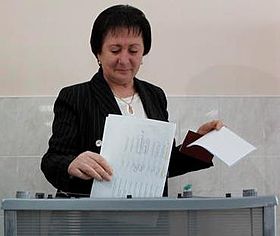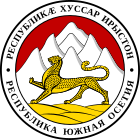|
2011 South Ossetian presidential election
Presidential elections were held in South Ossetia on 13 November 2011.[1] A referendum was held on the same day.[2] A run-off was held on 27 November, but the result were invalidated by the Supreme Court of South Ossetia. A new election was scheduled for 25 March 2012.[3] CandidatesIncumbent president Eduard Kokoity was constitutionally barred from serving a third term in office. Attempts were made to call a referendum to change the constitution, but this was blocked by the Supreme Court. Another attempt to change the constitution by a two-thirds majority in parliament was blocked by parliamentary chairman and Communist Party of South Ossetia leader Stanislav Kochiev.[4] Kokoity himself stated he had no intention in seeking a third term,[4][5] and called on everybody to refrain from initiatives to allow him to serve a third term. Kokoity made it clear that he would not disappear from the South Ossetian political scene.[6] In the end, 17 candidates were registered by the electoral commission, including former Prime minister Merab Chigoev, former education minister Alla Dzhioyeva, former minister of Information, Communication and Mass Media Georgiy Kabisov, and incumbent Emergencies Minister Anatoly Bibilov.[7][8] Days before the election, candidate Ivar Bestaev withdrew from the election, his name was not included on the ballots. This left 16 candidates,[9] but in the following days five more candidates withdrew,[10] including Chigoev.[11] Anatoly Bibilov claimed to be backed by Russia.[12] A letter in his support from Vladimir Putin was read in an election meeting, and several United Russia members of parliament visited the republic and expressed their support for Bibilov, the ruling Unity party's candidate.[13] Alla Dzhioyeva received support from Dzambolat Tedeev, the Russian freestyle wrestling team's coach, who was on 13 October expelled from South Ossetia on 14 October after being denied registration,[14] and Anatoly Barankevich, former minister of defence of South Ossetia, who both opposed incumbent president Eduard Kokoity, a former member of the Soviet Union's national wrestling team. Dzhioyeva campaigned on the deficit of fuel, lack of cellular network in parts of the republic and misappropriated funds provided for the post-war reconstruction of South Ossetia by Russia.[15] Election dayPolling stations were open from 8:00 until 20:00. There were 86 such stations, located all over the country, as well as in Moscow and Sukhumi. Special polling stations were opened for South Ossetian citizens living in North Ossetia–Alania.[11] In South Ossetia, a turnout of 50% + 1 vote is required for an election to be valid. This threshold was reached around 16:00. ResultsThe two most successful participants were Bibilov, with 25.9% of votes cast, and Dzhioyeva, with a 24.8% share of the vote. They went through to a runoff on 27 November, which was needed as no candidate had achieved a majority in the first round. Preliminary results for the second round released on 27 November show Dzhioyeva in the lead, with 8,955 votes to Bibilov's 6,205.[16] With 87% of the vote processed, Dzhioyeva had 14,828 votes to 10,462 for Bibilov.[17] Dzhioyeva claimed to have the final results showing she had won with 16,454 votes.[18] However, the Unity Party filed a complaint at the Supreme Court of South Ossetia, alleging Dzhioyeva's campaign used illegal means to secure the victory. The Supreme Court subsequently declared the election invalid.[19] A new election date was agreed upon for 25 March 2012.[3] The Central Election Commission subsequently announced that the final results of the second round would not be released.[20]
References
|
||||||||||||||||||||||||||||||||||||||||||||||||||||||||||||||||||||||||||||||||||||||||||||||||||||||||||||||||||||||||||||||||||||||||||||||||||||||||||||


